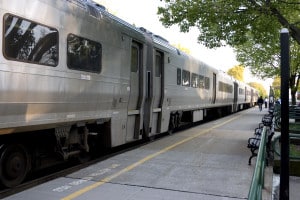The Baker administration’s interpretation of a cap on MBTA fare hikes adopted by the Legislature in 2013 appears to be in contrast to the original sponsor of that legislation – but that might not make a difference.
Activists and key senators maintain that the 2013 tax law was meant to cap fare hikes at 5 percent every two years, while a key House chairman and the Baker administration are pointing to the same law and saying it clearly caps fare hikes at 10 percent every two years.
The MBTA could next implement fare hikes on July 1, 2016, at the earliest, and while there have been discussions at the MBTA’s Fiscal and Management Control Board, there is no proposal, according to a T spokesman.
At stake for riders is potentially significant variation in how much they will see fares increase. For the most expensive commuter rail pass, the difference per month between 5 percent and 10 percent is $18. For those with a subway pass the difference is $3.75 per month, and the cap limits the overall fare increase, so on certain modes of transit the percentage increase could be greater than on others.
“The Senate’s position was clear from the beginning,” Sen. Tom McGee, the Senate Transportation Committee chairman, told the News Service. “We came up with the position that 5 percent over two years was the appropriate fare increase and that the cap made sense.”
“In my view, the language we passed in 2013 does permit as much as a 10 percent increase, consisting of 5 percent year one, 5 percent year two,” Rep. Bill Straus, the House chairman of the Transportation Committee, told the News Service.
Straus and McGee both served on the closed-door conference committee that reconciled House and Senate versions of the bill, where a Senate provision establishing a cap on fare hikes was altered. Straus said he didn’t know whether McGee specifically agreed to the slight but potentially significant change, which he described as an attempt at clarification, saying it “implements what was a Senate initiative.”
Katherine Clark, who was then a senator and is now a representative, sponsored the fare-hike-cap amendment, which was not addressed on the House side, Straus confirmed. The conference committee inserted the word “annual” into a provision that limited fare increases to “intervals of less than 24 months or at a rate greater than 5 percent,” an alteration that even opponents of the 10-percent cap acknowledge can be interpreted to limit fare hikes to 10 percent every two years.
The point of the provision was to replace the ad hoc system of fare hikes with a new system where increases would be regular and moderate.
Citing the passage of time, McGee said he couldn’t say whether he had agreed to the change or whether he even knew about it.
“It’s two years ago, but my position at the time and my position today is that the right approach was 5 percent cap over a two-year period,” McGee told the News Service. Noting a separate provision of the bill that refers to a 5 percent cap, McGee said there would be a discussion about how to “clarify” the legislation.
Senate President Stanley Rosenberg on Thursday told the News Service he had spoken to McGee about the issue, and he said it is “not clear” whether there would be any legislative action on the issue.
On Wednesday, Rosenberg said a 5 percent difference in fare hikes for the MBTA is not a significant financial factor for the agency, which faces regular deficits plugged with taxpayer dollars.
“It’s really the flea on the tail of the dog. The needs of the T and our public transit systems and our road and bridge program are so significant that focusing on the size of the fare increase is really focusing on the wrong question,” Rosenberg told reporters on Wednesday. He also said, “I think it’s fair to revisit the fare cap.”
The 2013 tax law itself, the basic structure of which was arranged beforehand by former Senate President Therese Murray and Speaker Robert DeLeo, has had a few major pieces removed from it. Lawmakers swiftly repealed a tax on computer services and voters in 2014 repealed a provision that would have made the gas tax automatically increase with inflation.
The law aimed to put the MBTA on more solid financial footing after a calamitous attempt to deal with the T’s finances the year before.
Exhaustive public hearings around the service area preceded a move by the MBTA in 2012 to raise fares by an average of 23 percent across the board. In 2014 fares were increased an average of 5 percent.




 |
| 

